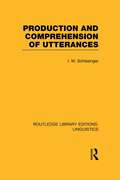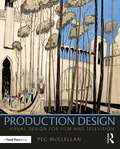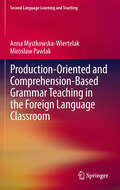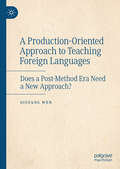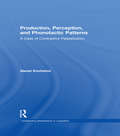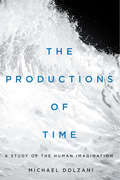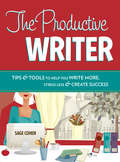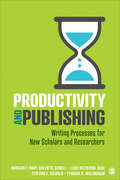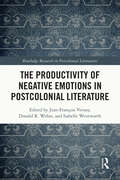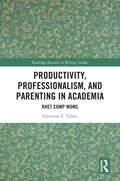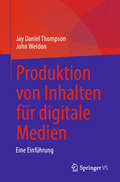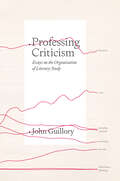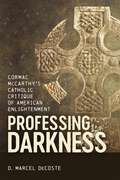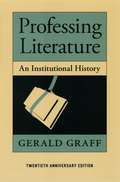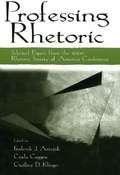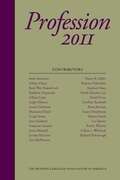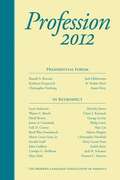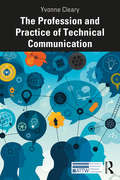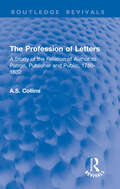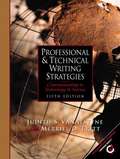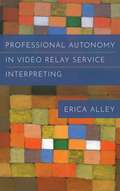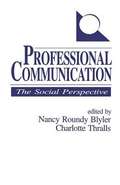- Table View
- List View
Producing Women's Poetry, 1600-1730
by Gillian WrightProducing Women's Poetry is the first specialist study to consider English-language poetry by women across the seventeenth and early eighteenth centuries. Gillian Wright explores not only the forms and topics favoured by women, but also how their verse was enabled and shaped by their textual and biographical circumstances. She combines traditional literary and bibliographical approaches to address women's complex use of manuscript and print and their relationships with the male-generated genres of the traditional literary canon, as well as the role of agents such as scribes, publishers and editors in helping to determine how women's poetry was preserved, circulated and remembered. Wright focuses on key figures in the emerging canon of early modern women's writing, Anne Bradstreet, Katherine Philips and Anne Finch, alongside the work of lesser-known poets Anne Southwell and Mary Monck, to create a new and compelling account of early modern women's literary history.
Production and Comprehension of Utterances: Linguistics: Production And Comprehension Of Utterances (Routledge Library Editions: Linguistics)
by I. M. SchlesingerIn this volume, the author reviews the results of research on language performance and proposes a model of production and comprehension. Although recent developments in linguistics are taken into account, consideration of other requirements of a performance model leads to the conclusion that the grammar the speaker has in mind differs from the grammar as currently conceived of by most linguists. The author is also critical of recent computer simulations of language performance on the basis that they fall short of describing what goes on in human production and comprehension. The author therefore proposes that the basic issues must be rethought and new theoretical foundations reformulated, in order to arrive at a viable theory of language functioning. In developing the framework of the model presented in this book, requirements of flexibility in the performance mechanisms, the probabilistic nature of comprehension processes, and the interleaving of linguistic rules with context and knowledge of the world are emphasized.
Production Design: Visual Design for Film and Television
by Peg McClellanProduction Design: Visual Design for Film and Television is a hands-on guide to the craft of Production Design and Art Direction. Author Peg McClellan gives an insider’s view of the experiences and challenges of working as a Production Designer in film and television. The book covers three major areas, starting with an overview and the basics of job responsibilities, the artistic approach and the background which every Production Designer needs to be familiar with, and progressing to the mechanics of the role with a day-to-day breakdown of the job itself. McClellan takes you through script analysis, team collaborations, the hierarchy of a production, hiring a team, the business elements, locations, studio facilities, handling change, and everything in between. With case studies, insights from successful Production Designers, and inspiration in the form of over 200 colour photos and illustrations from storyboards to sets, this is the ideal book for students seeking a career in production design, and professionals looking to further their design knowledge.
The Production of Books in England 1350-1500
by Alexandra Gillespie Daniel WakelinBetween roughly 1350 and 1500, the English vernacular became established as a language of literary, bureaucratic, devotional and controversial writing; metropolitan artisans formed guilds for the production and sale of books for the first time; and Gutenberg's and eventually Caxton's printed books reached their first English consumers. This book gathers the best new work on manuscript books in England made during this crucial but neglected period. Its authors survey existing research, gather intensive new evidence and develop new approaches to key topics. The chapters cover the material conditions and economy of the book trade; amateur production both lay and religious; the effects of censorship; and the impact on English book production of manuscripts and artisans from elsewhere in the British Isles and Europe. A wide-ranging and innovative series of essays, this volume is a major contribution to the history of the book in medieval England.
Production-oriented and Comprehension-based Grammar Teaching in the Foreign Language Classroom
by Anna Mystkowska-Wiertelak Mirosław PawlakThe book addresses one of the key controversies in teaching foreign language grammar, which is the utility of production-oriented instruction, as exemplified in the PPP sequence, and comprehension-based teaching, as implemented in interpretation tasks and processing instruction. It provides a thorough overview of issues related to learning and teaching grammar, with a particular focus on input-oriented approaches, and reports the findings of four studies which sought to compare their effects with instruction based on different forms of output practice. The findings serve as a basis for guidelines on how the two options can be successfully combined in the classroom
A Production-Oriented Approach to Teaching Foreign Languages: Does a Post-Method Era Need a New Approach?
by Qiufang WenThis book introduces and explains the production-oriented approach (POA) to teaching foreign languages, a new approach developed by the author through 15 years of rigorous experimentation. Addressing the common challenge of separating input from output in language learning, the book details POA procedures in three phases: motivating, enabling, and assessing. It explores the theoretical underpinnings of the POA, including sociocultural, usage-based linguistic, second language acquisition, and curriculum theories. The author presents a series of case studies showcasing the POA in practice. She also provides a comparative analysis with the task-based approach and project-based learning, highlighting similarities and differences between the two. This book will be essential reading for teachers and scholars in applied linguistics, modern foreign languages, language acquisition, and language education, offering valuable insights and practical guidance for enhancing language teaching effectiveness.
Production, Perception, and Phonotactic Patterns: A Case of Contrastive Palatalization (Outstanding Dissertations in Linguistics)
by Alexei KochetovFirst Published in 2002. Routledge is an imprint of Taylor & Francis, an informa company.
The Productions of Time: A Study of the Human Imagination
by Michael DolzaniMyth criticism flourished in the mid-twentieth century under the powerful influence of Canadian thinker Northrop Frye. It asserted the need to identify common, unifying patterns in literature, arts, and religion. Although it was eclipsed by postmodern theories that asserted difference and conflict, those theories proved incapable of inspiring solidarity or guiding social action. The Productions of Time argues for a return to myth criticism in order to refine and extend its vision.With the aim of rehabilitating myth criticism for our time, Michael Dolzani sketches an anatomy of the imagination as demonstrated in the total body of its productions, including literature, mythology, the arts, popular culture, and religious and political texts. Dolzani situates a vast panoply of images, character types, plot structures, themes, and genres to better understand their purposes, their recurrences across broad spans of history, and their interrelations. Illustrating the relationship between mythology and history, The Productions of Time proposes a symbolic language as a way of enabling dialogue across ideological and individual differences.Arguing for the ethical and intellectual necessity of conceiving a unifying pattern that transcends differences, The Productions of Time demonstrates that imagination is part of the human inheritance, common to all, not just to poets and mystics.
The Productive Writer: Strategies and Systems for Greater Productivity, Profit and Pleasure
by Sage CohenTeacher, poet, business woman, and blogger Cohen presents an encouraging and galvanizing guide to productive writing. She provides copious exercises to bolster writing output as well as solutions to common problems faced by writers. Topics covered include thinking positive thoughts, embracing fear, and writing in the margins of a full-time life. The text includes inspirational quotes from the famous and snippets of easily remembered advice. The blocked or beginning writer is sure to find many helpful hints. Annotation ©2011 Book News, Inc. , Portland, OR (booknews. com)
Productivity and Publishing: Writing Processes for New Scholars and Researchers
by Margaret-Mary Sulentic Dowell Leah Katherine Saal Cynthia F. DiCarlo Tynisha D. MeidlProductivity and Publishing: Writing Processes for New Scholars & Researchers by Margaret-Mary Sulentic Dowell, Leah Katherine Saal, Cynthia F. DiCarlo, and Tynisha D. Willingham takes the challenges and confusion out of academic writing and journal publishing by empowering readers to find the writing process that works for them. Activities and writing exercises help readers determine their research agendas, set realistic writing goals, , and follow time-tested and editor-approved processes for writing and revising journal articles. Topics cover the writing and publishing process from start to finish, addressing common issues for new academics like avoiding the blank page, selecting an appropriate journal, dealing with reviews, and leveraging your research into multiple articles and a comprehensive research agenda. Experts weigh in on crucial topics such as scholarly metrics and exposure and offer a journal editor’s perspective on the writing and publishing process. Build your academic career on a solid foundation with Productivity and Publishing.
Productivity and Publishing: Writing Processes for New Scholars and Researchers
by Margaret-Mary Sulentic Dowell Leah Katherine Saal Cynthia F. DiCarlo Tynisha D. MeidlProductivity and Publishing: Writing Processes for New Scholars & Researchers by Margaret-Mary Sulentic Dowell, Leah Katherine Saal, Cynthia F. DiCarlo, and Tynisha D. Willingham takes the challenges and confusion out of academic writing and journal publishing by empowering readers to find the writing process that works for them. Activities and writing exercises help readers determine their research agendas, set realistic writing goals, , and follow time-tested and editor-approved processes for writing and revising journal articles. Topics cover the writing and publishing process from start to finish, addressing common issues for new academics like avoiding the blank page, selecting an appropriate journal, dealing with reviews, and leveraging your research into multiple articles and a comprehensive research agenda. Experts weigh in on crucial topics such as scholarly metrics and exposure and offer a journal editor’s perspective on the writing and publishing process. Build your academic career on a solid foundation with Productivity and Publishing.
The Productivity of Negative Emotions in Postcolonial Literature (Routledge Research in Postcolonial Literatures)
by Donald R. Wehrs Isabelle WentworthThis volume explores the possibilities and potentialities of “negative” affect in postcolonial literature and literary theory, featuring work on postcolonial studies, First Nations studies, cognitive cultural studies, cognitive historicism, reader response theory, postcolonial feminist studies, and trauma studies. The chapters of this work investigate negative affect in all its types and dimensions: analyses of the structures of feeling created by socio-political forces; assemblages and alliances produced by negative emotion; enactive interrelationships of emotion and environment; and the ethical implications of emotional response, to name a few. It seeks to rebrand “negative” emotions as productive forces which can paradoxically confer pleasure, agential power, and social progress through literary representation.
Productivity, Professionalism, and Parenting in Academia: Rhet Comp Moms (Routledge Research in Writing Studies)
by Christine E. TulleyDrawing on time use diary analysis, this unique and detailed study fills in the larger narrative about what it takes, hour by hour, to navigate academic motherhood with a rhetoric and composition career.Looking specifically at the intersections between parenting and writing for publication in order to find out how and when writing for career-advancing tasks such as publication occur, but also through the lens of disciplinary time constraints including heavy grading and administrative workloads, the book examines support systems noted within diary entries that make combining motherhood and a career in rhetoric and composition possible. Using both quantitative analysis of hours and qualitative coding of time use diaries from rhet comp moms, this book answers questions about publishing, professionalism, and parenting.This book will interest scholars and graduate students working in the discipline of rhetoric, writing, and composition, particularly those working on labor and professional issues, on gender and equality within the discipline, and anyone working in all fields looking for ways to foster a better work–life balance.
Produktion von Inhalten für digitale Medien: Eine Einführung
by John Weldon Jay Daniel ThompsonDieses Buch bietet eine Einführung in die Produktion digitaler Medieninhalte im einundzwanzigsten Jahrhundert. Dabei werden die Inhalte aus den Berufsfeldern Journalismus, Öffentlichkeitsarbeit und Marketing behandelt. Das Buch gibt einen Einblick, wie Inhalte präsentiert werden und befasst sich mit den rechtlichen und ethischen Fragen, mit denen sich die Produzenten von Inhalten konfrontiert sehen, sowie mit der Frage, wie diese Probleme erfolgreich bewältigt werden können. Die Kapitel enthalten auch Interviews mit Medienfachleuten und Quizfragen, die es den Lesern ermöglichen, das durch die Lektüre des jeweiligen Kapitels erworbene Wissen zu festigen.
Professing Criticism: Essays on the Organization of Literary Study
by John GuilloryA sociological history of literary study—both as a discipline and as a profession. As the humanities in higher education struggle with a labor crisis and with declining enrollments, the travails of literary study are especially profound. No scholar has analyzed the discipline’s contradictions as authoritatively as John Guillory. In this much-anticipated new book, Guillory shows how the study of literature has been organized, both historically and in the modern era, both before and after its professionalization. The traces of this volatile history, he reveals, have solidified into permanent features of the university. Literary study continues to be troubled by the relation between discipline and profession, both in its ambivalence about the literary object and in its anxious embrace of a professionalism that betrays the discipline’s relation to its amateur precursor: criticism. In a series of timely essays, Professing Criticism offers an incisive explanation for the perennial churn in literary study, the constant revolutionizing of its methods and objects, and the permanent crisis of its professional identification. It closes with a robust outline of five key rationales for literary study, offering a credible account of the aims of the discipline and a reminder to the professoriate of what they already do, and often do well.
Professing Darkness: Cormac McCarthy's Catholic Critique of American Enlightenment
by D. Marcel DeCosteProfessing Darkness confirms the centrality of Catholic thought, imagery, and sacrament to the spiritual and ethical outlook of the work of Cormac McCarthy and, more specifically, its consistent assessment of Enlightenment values and their often-catastrophic realization in American history. D. Marcel DeCoste surveys McCarthy’s fiction from both his Tennessee and Southwest periods, with chapters devoted to eight of his published novels—from Outer Dark to The Road—and a conclusion that examines the writer’s screenplay for The Counselor and the duology of The Passenger and Stella Maris. DeCoste’s attentive, wide-ranging interpretations demonstrate that McCarthy’s work mounts a sustained critique of core Enlightenment ideals and their devastating results in the American context, especially for Indigenous peoples, the environment, the viability of community, and the integrity of a self irreducible to the status of a commodity. Professing Darkness shows that Roman Catholic understandings of Penance and Eucharist, along with specific Catholic teachings—such as those regarding the goodness of Creation, the nature of evil, the insufficiency of the self, and the radical invitation to conversion—enable McCarthy’s revelatory engagement with American Enlightenment. An important contribution to the ever-expanding critical literature on a towering contemporary author, Professing Darkness offers an innovative reading of both the spiritual and political valences of McCarthy’s writing.
Professing Literature: An Institutional History
by Gerald GraffWidely considered the standard history of the profession of literary studies, Professing Literature unearths the long-forgotten ideas and debates that created the literature department as we know it today. In a readable and often-amusing narrative, Gerald Graff shows that the heated conflicts of our recent culture wars echo—and often recycle—controversies over how literature should be taught that began more than a century ago. Updated with a new preface by the author that addresses many of the provocative arguments raised by its initial publication, Professing Literature remains an essential history of literary pedagogy and a critical classic. “Graff’s history. . . is a pathbreaking investigation showing how our institutions shape literary thought and proposing how they might be changed.”— The Norton Anthology of Theory and Criticism
Professing Rhetoric: Selected Papers From the 2000 Rhetoric Society of America Conference
by Frederick J. Antczak Geoffrey D. KlingerRepresenting current theory and research in rhetoric, this volume brings together scholarship from a variety of orientations--theoretical, critical, historical, and pedagogical. Some contributions cover work that has previously been silenced or unrecognized, including Native American, African American, Latino, and women's rhetorics. Others explore rhetoric's relationship to performance and to the body, or to revising canons, stases, topoi, and pisteis. Still others are reworking the rhetorical lexicon to comprise contemporary theory. Among these diverse interests, rhetoricians find common themes and share intellectual and pedagogical enterprises that hold them together even as their institutional situations keep them apart. Topics discussed in this collection include: *Rhetoric as figurality; comparative and contrastive rhetorics; rhetoric and gender; and rhetorics of science and technology; *Rhetoric and reconceptions of the public sphere; rhetoric and public memory; and rhetorics of globalization and social change, including issues of race, ethnicity, and nationalism; *Rhetoric's institutionalized place in the academy, in relation to other humanities and to the interpretive social sciences; and *The place of rhetoric in the formation of departments and the development of pedagogy With its origins in the 2000 Rhetoric Society of America (RSA) conference, this volume represents the range and vitality of current scholarship in rhetoric. The conversations contained herein indicate that professing rhetoric is, at the turn of the millennium, an intellectual activity that engages with and helps formulate the most important public and scholarly questions of today. As such, it will be engaging reading for scholars and students, and is certain to provoke further thought, discussion, and exploration.
Profession 2011 (Profession Ser.)
by The Modern Language Association of AmericaThis issue of Profession contains Sidonie Smith's introduction to her Presidential Forum (held at the 2011 MLA convention) and the essays of forum participants Hillary Chute, Marianne Hirsch, Leigh Gilmore, Craig Howes, Françoise Lionnet, Nancy K. Miller, David Palumbo-Liu, Brian Rotman, Leo Spitzer, Robert Warrior, and Gillian L. Whitlock. The issue also features a section on evaluating digital scholarship. Introduced by Susan Schreibman, Laura Mandell, and Stephen Olsen, the section includes essays by Steve Anderson, Kathleen Fitzpatrick, Jerome McGann, Tara McPherson, Bethany Nowviskie, and Geoffrey Rockwell. The issue's other essays are by Reed Way Dasenbrock, Gillian Gane, Laurie Grobman, Joyce Kinkead, David Porter, and Richard Yarborough. The issue concludes with two sets of MLA guidelines--on professional employment practices for non-tenure-track faculty members and on evaluating translations as scholarship--and a listing of reports, surveys, statements, and other resources recently added to the MLA Web site.
Profession 2012 (Profession Ser.)
by The Modern Language AssociationThis issue of Profession contains Russell A. Berman's introduction to his Presidential Forum, Language, Literature, Learning, held at the 2012 MLA convention, and the essays of the forum participants Kathleen Fitzpatrick, Christopher Freeburg, Jack Halberstam, B. Venkat Mani, and Imani Perry. To mark the journal's thirty-fifth anniversary, the issue also features a retrospective sampling of articles that illustrate the evolution of the profession and of the professional issues the journal has addressed since its inception in 1977. The retrospective section includes articles by Leon Anderson; Wayne C. Booth; Heidi Byrnes; James A. Castaeda; Erik D. Curren; Reed Way Dasenbrock; Henry Louis Gates, Jr.; Gerald Graff; John Guillory; Carolyn G. Heilbrun; Mara Holt; Dorothy James; Claire J. Kramsch; George Levine; Philip Lewis; Alan Liu; Helene Moglen; Christopher Newfield; Mary Louise Pratt; Judith Ryan; Jack H. Schuster; and Domna C. Stanton.
The Profession and Practice of Technical Communication (ATTW Series in Technical and Professional Communication)
by Yvonne ClearyThis practical text offers a research-based account of the technical communication profession and its practice, outlining emergent touchpoints of this fast-changing field while highlighting its diversity. Through research on the history and the globalization of technical communication and up-to-date industry analysis, including first-hand narratives from industry practitioners, this book brings together common threads through the industry, suggests future trends, and points toward strategic routes for development. Vignettes from the workplace and examples of industry practice provide tangible insights into the different paths and realities of the field, furnishing readers with a range of entry routes and potential career sectors, workplace communities, daily activities, and futures. This approach is central to helping readers understand the diverse competencies of technical communicators in the modern, globalized economy. The Profession and Practice of Technical Communication provides essential guidance for students, early professionals, and lateral entrants to the profession and can be used as a textbook for technical communication courses.
The Profession of Letters: A Study of the Relation of Author to Patron, Publisher and Public, 1780-1832 (Routledge Revivals)
by A.S. CollinsOriginally published in 1928, this is the companion volume which follows on from Authorship in the Days of Johnson. The book discusses the reading public and socio-economic effects on educational and recreational literacy from improved communications, the spread of radicalism and free-thinking and the industrial revolution. The advance of popular literature is considered and the role which the monthlies, weeklies and dailies contributed to this. The rise of the novel and the social recognition of writers is also considered.
Professional and Technical Writing Strategies: Communicating in Technology and Science (Fifth Edition)
by Merrill D. Tritt Judith S. VanalstyneThis book is designed to be used as a textbook by college and university students. However, its scope is, by design, much broader than that. It has applications for those writing in the fields of science, technology, business. It can be used by businesses to strengthen the writing abilities of those writing manuals. An excellent book with a wide range of applications. Good examples and practice exercises.
Professional Autonomy in Video Relay Service Interpreting (Gallaudet Studies In Interpret #17)
by Erica AlleyVideo relay service (VRS) is a federally funded service that provides telecommunications access for deaf people. It is also a for-profit industry with guidelines that may limit the autonomy of the sign language interpreters who work in VRS settings. In this volume, Erica Alley examines how VRS interpreters, or “Communication Assistants,” exercise professional autonomy despite the constraints that arise from rules and regulations established by federal agencies and corporate entities. Through interviews with VRS interpreters, Alley reveals the balance they must achieve in providing effective customer service while meeting the quantitative measures of success imposed by their employer in a highly structured call center environment. Alley considers the question of how VRS fits into the professional field of interpreting, and discovers that—regardless of the profit-focused mentality of VRS providers—interpreters make decisions with the goal of creating quality customer service experiences for deaf consumers, even if it means “breaking the rules.” Her findings shed light on the decision-making process of interpreters and how their actions are governed by principles of self-care, care for colleagues, and concern for the quality of services provided. Professional Autonomy in Video Relay Service Interpreting is essential reading in interpreter education courses and interpreter training programs.
Professional Communication: The Social Perspective
by Nancy Roundy Blyler Charlotte ThrallsThis volume examines socially-based theory and research, pedagogy and practice in professional communication. The contributors provide a comprehensive overview of the social perspective which emphasizes the context of communication, and then distinguish it from positivistic, cognitive and other competing approaches. After establishing a broad framework for situating developments in professional communication research, the book then moves on to: explore more particular topics, issues and problems within the perspective; examine the historical and theoretical traditions in rhetoric, semiotics, literary criticism, philosophy of science, social psychology and cultural anthropology; discuss implications for classroom practice in professional communications.

